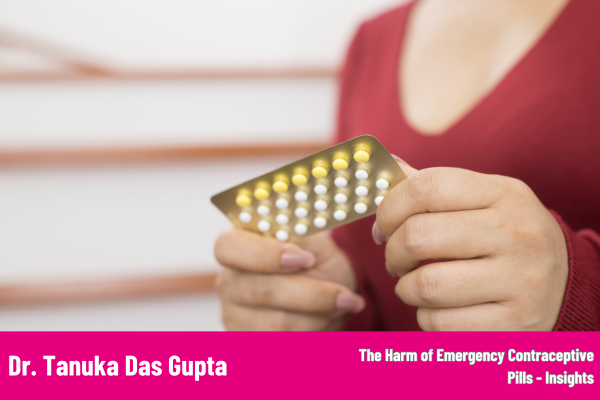What is the Harm of Emergency Contraceptive Pill?
Emergency contraceptive pills (ECPs), often referred to as “morning-after pills,” are a popular option for preventing pregnancy after unprotected intercourse. While these pills can be a critical tool in avoiding unintended pregnancies, their use is not without potential risks and side effects. Dr. Tanuka Dasgupta, one of the best lady gynecologists and infertility specialists in Kolkata, provides valuable insights into the possible harms associated with emergency contraceptive pills.
How Do Emergency Contraceptive Pills Work?
Before diving into the potential harms, it’s essential to understand how ECPs function. These pills primarily work by delaying or preventing ovulation, inhibiting fertilization, or preventing a fertilized egg from implanting in the uterus. ECPs are most effective when taken as soon as possible after unprotected intercourse, ideally within 72 hours.
Potential Harms and Side Effects
- Hormonal Imbalance: Emergency contraceptive pills contain high doses of hormones, which can disrupt your body’s natural hormonal balance. This imbalance may lead to irregular menstrual cycles, spotting between periods, and unpredictable changes in flow.
- Gastrointestinal Issues: Nausea and vomiting are common side effects of ECPs. These symptoms can be severe in some cases, leading to dehydration and discomfort. Taking the pill with food or an anti-nausea medication may help mitigate these effects.
- Impact on Fertility: Although ECPs are not intended for regular use, some women may rely on them frequently. Repeated use can lead to complications such as irregular ovulation and menstrual cycles, potentially impacting fertility in the long run. It is crucial to consult a gynecologist before considering regular use of emergency contraceptives.
- Cardiovascular Risks: Women with pre-existing health conditions, such as hypertension or cardiovascular diseases, may face increased risks when using ECPs. The high hormonal content can exacerbate these conditions, leading to more severe health issues.
- Psychological Impact: The use of emergency contraception can sometimes lead to emotional and psychological distress. The fear of unintended pregnancy and the potential side effects of the pill can cause anxiety and stress, affecting overall mental well-being.
Safer Alternatives
Dr. Tanuka Dasgupta advises that while emergency contraceptive pills can be a lifesaver in certain situations, they should not be used as a regular contraceptive method. There are safer and more reliable contraceptive options available, such as birth control pills, intrauterine devices (IUDs), and barrier methods like condoms. These methods offer more consistent protection with fewer health risks.
Conclusion
Emergency contraceptive pills are a useful tool for preventing unintended pregnancies, but their use comes with potential risks and side effects. It is essential to understand these harms and use ECPs responsibly. Consulting with a gynecologist, like Dr. Tanuka Dasgupta, can help you choose the most suitable and safe contraceptive method for your needs.
For more personalized advice on contraception and fertility, schedule a consultation with Dr. Tanuka Dasgupta, one of Kolkata’s leading gynecologists and infertility specialists.


